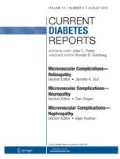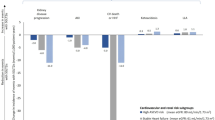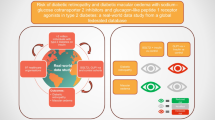Abstract
Despite a clear epidemiologic relationship between hemoglobin A1c levels and the risk of cardiovascular (CV) disease in patients with type 2 diabetes mellitus (T2DM), prospective studies examining the benefit of intensive glucose lowering in reducing CV events have yielded conflicting results. Controversy over the choice of antidiabetic therapy for lowering macrovascular events has existed for nearly four decades, beginning with the potential risk of increased CV mortality with sulfonylurea use. Although sulfonylureas were subsequently felt to be safe, a more recent controversy was raised as to whether rosiglitazone use was associated with an increased risk of CV events. Additionally, early positive results for metformin in reducing macrovascular events have not been clearly substantiated. Because a typical patient with T2DM may live 20 to 40 years with the disease, long-term prevention of CV events is very important. An evidenced-based review of choice of antidiabetic therapy to reduce CV events in T2DM is discussed below.
Similar content being viewed by others
Abbreviations
- ACCORD:
-
Action to Control Cardiovascular Risk in Diabetes
- BARI 2D:
-
Bypass Angioplasty Revascularization Investigation 2 Diabetes
- HEART2D:
-
Hyperglycemia and Its Effect After Acute Myocardial Infarction on Cardiovascular Outcomes in Patients with Type 2 Diabetes Mellitus
- PROactive:
-
Prospective Pioglitazone Clinical Trial in Macrovascular Events
- RECORD:
-
Rosiglitazone Evaluation for Cardiac Outcomes and Regulation of Glycaemia in Diabetics
- 4 T:
-
Treat To Target in Type 2 Diabetes
- UGDP:
-
University Group Diabetes Program
- UKPDS:
-
United Kingdom Prospective Diabetes Study
- VADT:
-
Veteran Affairs Diabetes Trial
References
Papers of particular interest, published recently, have been highlighted as: •• Of major importance
Stamler J, Vaccaro O, Neaton JD, Wentworth D: Diabetes, other risk factors and 12-year cardiovascular mortality for men screened in the Multiple Risk Factor Invention Trial. Diabetes Care 1993, 16:434–444.
Mak KH, Moliterno DJ, Granger CB, et al.: Influence of diabetes mellitus on clinical outcome in the thrombolytic era of acute myocardial infarction. GUSTO-I Investigators. Global Utilization of Streptokinase and Tissue Plasminogen Activator for Occluded Coronary Arteries. J Am Coll Cardiol 1997, 30:171–179.
Haffner SM, Lehto S, Rönnemaa T, et al.: Mortality from coronary heart disease in subjects with type 2 diabetes and in nondiabetic subjects with and without prior myocardial infarction. N Engl J Med 1998, 339:229–234.
Wild S, Roglic G, Green A, et al.: Global prevalence of diabetes: estimates for the year 2000 and projections for 2030. Diabetes Care 2004, 27:1047–1053.
Buse J, Ginsberg HN, Bakris GL, et al.: Primary prevention of cardiovascular disease in people with diabetes mellitus: a scientific statement from the American Heart Association and the American Diabetes Association. Circulation 2007, 115:114–126.
Selvin E, Marinopoulos S, Berkenblit G, et al.: Meta-analysis: glycosylated hemoglobin and cardiovascular disease in diabetes mellitus. Ann Intern Med 2004, 141:421–431.
Feinglos N, Bethel A: Therapy of type 2 diabetes, cardiovascular death, and the UGDP. Am Heart J 1999, 138:S346–S352.
Schotborgh C, Wilde A: Sulfonylurea derivatives in cardiovascular research and in cardiovascular patients. Cardiovasc Res 1997, 34:73–80.
Smits P, Bijlstra P, Russel F, et al:. Cardiovascular effects of sulphonylurea derivatives. Diab Res Clin Pract 1996, 31(Suppl):S55–S59.
Klepzig H, Kober G, Matter C, et al.: Sulfonylureas and ischaemic preconditioning: a double-blind, placebo-controlled evaluation of glimepiride and glibenclamide. Eur Heart J 1999, 20:439–444.
Intensive blood glucose control with sulfonylureas or insulin compared with conventional treatment and risk of complications in patients with type 2 diabetes (UKPDS33). UK Prospective Diabetes Study (UKPDS) Group [no authors listed]. Lancet 1998, 352:837–853. (Published erratum appears in Lancet 1999, 354:602.)
Nathan DM, Buse JB, Davidson MB, et al.: Medical management of hyperglycemia in type 2 diabetes: a consensus algorithm for the initiation and adjustment of therapy: a consensus statement of the American Diabetes Association and the European Association for the Study of diabetes. Diabetes Care 2009, 32:193–203.
Stratton IM, Adler AI, Neil HA, et al.: Association of glycaemia with microvascular and macrovascular complications of type 2 diabetes (UKPDS 35): prospective observational study. BMJ 2000, 321:405–412.
Effect of intensive blood glucose control with metformin on complications in overweight patients with type 2 diabetes (UKPDS34). UK Prospective Diabetes Study (UKPDS) Group [no authors listed]. Lancet 1998, 352:854–865. (Published erratum appears in Lancet 1998, 352:1557.)
Selvin E, Bolen S, Yeh HC, et al.: Cardiovascular outcomes in trials of oral diabetic medications: a systematic review. Arch Intern Med 2008, 168:2070–2080.
Kahn S, Haffner S, Heise M, et al.: Glycemic durability of rosiglitazone, metformin or glyburide monotherapy. N Engl J Med 2006, 356:2427–2443.
Rao A, Kuhayiya N, Reynolds K, et al.: Is the combination of sulfonylurea and metformin associated with an increased risk of cardiovascular disease or all-cause mortality? Diabetes Care 2008, 31:1672–1678.
Cook M, Girman C, Stein P, et al.: Glycemic control continues to deteriorate after sulfonylureas are added to metformin among patients with type 2 diabetes. Diabetes Care 2005, 28:995–1000.
•• Holman R, Paul S, Bethel A, et al.: A ten-year follow-up of intensive glucose control in type 2 diabetes. N Engl J Med 2008, 359:1577–1589. Ten-year results of the UKPDS confirm a long-term cardiovascular benefit of intensive glucose lowering with conventional agents (SU, insulin, and metformin). This is consistent with prior studies suggesting that glucose control may take many years before a benefit is seen compared with the effects of lipid lowering.
Shaw J, Wilmot R, Kilpatrick E: Establishing pragmatic estimated GFR thresholds to guide metformin prescribing. Diabetes Med 2007, 24:1160–1163.
Eurich D, Majumbar S, McAlister F, et al.: Improved clinical outcomes associated with metformin in patients with diabetes and heart failure. Diabetes Care 2005, 28:2345–2351.
Masoudi FA, Inzucchi SE, Wang Y, et al.: Thiazolidinediones, metformin, and outcomes in older patients with diabetes and heart failure. Circulation 2005, 111:583–590.
Parulkar AA, Pendergrass ML, Granda-Ayala R, et al.: Non-hypoglycemic effects of thiazolidinediones. Ann Intern Med 2001, 134:61–71.
Yue Tl TL, Chen J, Bao W, et al.: In vivo myocardial protection from ischemia/reperfusion injury by the peroxisome proliferator-activated receptor-gamma agonist rosiglitazone. Circulation 2001, 104:2588–2594.
Shiomi T, Tsutsui H, Hayashidani S, et al.: Pioglitazone, a peroxisome proliferator-activated receptor-gamma agonist, attenuates left ventricular remodeling and failure after experimental myocardial infarction. Circulation 2002, 106:3126–3132.
Sauer WH, Berlin JA, Kimmel SE: Thiazolidinediones and prevention of myocardial infarction in patients with type 2 diabetes. Circulation 2002, 106:2777.
Takagi T, Yamamuro A, Tamita K, et al.: Pioglitazone reduces neointimal tissue proliferation after coronary stent implantation in patients with type 2 diabetes mellitus: an intravascular ultrasound scanning study. Am Heart J 2003, 146:E5.
Choi D, Kim SK, Choi SH, et al.: Preventative effects of rosiglitazone on restenosis after coronary stent implantation in patients with type 2 diabetes. Diabetes Care 2004, 27:2654–2660.
Mazzone T, Meyer PM, Feinstein SB, et al.: Effect of pioglitazone compared with glimepiride on carotid intima-media thickness in type 2 diabetes: a randomized trial. JAMA 2006, 296:2572–2581.
Sidhu JS, Kaposzta Z, Markus HS, Kaski JC: Effect of rosiglitazone on common carotid intima-media thickness progression in coronary artery disease patients without diabetes mellitus. Arterioscler Thromb Vasc Biol 2004, 24:930–934.
Nissen SE, Nicholls SJ, Wolski K, et al.: Comparison of pioglitazone vs glimepiride on progression of atherosclerosis in patients with type 2 diabetes: the PERISCOPE randomized trial. JAMA 2008, 299:1561–1573.
Charbonnel B, Dormandy J, Erdmann E, et al.: The prospective pioglitazone clinical trial in macrovascular events (PROactive): can pioglitazone reduce cardiovascular events in diabetes? Study design and baseline characteristics of 5238 patients. Diabetes Care 2004, 27:1647–1653.
Betteridge DJ, DeFronzo RA, Chilton RJ: PROactive: time for a critical appraisal. Eur Heart J 2008, 29:969–983.
Nissen S, Wolski K: Effect of rosiglitazone on the risk of myocardial infarction and death from cardiovascular causes. N Engl J Med 2007, 356:2457–2471.
Diamond GA, Bax L, Kaul S: Uncertain effects of rosiglitazone on the risk for myocardial infarction and cardiovascular death. Ann Intern Med 2007, 147:578–581.
Singh S, Loke YK, Furberg CD: Long-term risk of cardiovascular events with rosiglitazone. A meta-analysis. JAMA 2007, 298:1189–1195.
Lincoff AM, Wolski K, Nicholls SJ, Nissen SE: Pioglitazone and risk of cardiovascular events in patients with type 2 diabetes mellitus: a meta-analysis of randomized trials. JAMA 2007, 298:1180–1188.
Home PD, Pocock SJ, Beck-Nielsen H, et al.: Rosiglitazone Evaluated for Cardiac Outcomes and Regulation of Glycaemia in Diabetes (RECORD): study design and protocol. Diabetologia 2005, 48:1726–1735.
•• Home PD, Pocock SJ, Beck-Nielsen H, et al.: Rosiglitazone evaluated for cardiovascular outcomes in oral agent combination therapy for type 2 diabetes: a multicentre, randomized, open-label trial (RECORD). Lancet 2009, 373:2125–2135. The final results of the RECORD trial meet the criteria of noninferiority with rosiglitazone compared with SU and metformin. No increased risk for CV events was seen, but event rates were too low to be conclusive. Rosiglitazone was associated with improved glycemic control compared with conventional therapy, similar to the findings in the ADOPT (A Diabetes Outcome Progression Trial) trial.
Lago RM, Singh PP, Nesto RW: Congestive heart failure and cardiovascular death in patients with prediabetes and type 2 diabetes given thiazolidinediones: a meta-analysis of randomized clinical trials. Lancet 2007, 370:1129–1136.
Duckworth W: Glucose control and vascular complications in veterans with type 2 diabetes. N Engl J Med 2009, 360:129–139.
Action to Control Cardiovascular Risk in Diabetes Study Group: Effects of intensive blood glucose lowering in type 2 diabetes. N Engl J Med 2008, 358:2545–2559.
•• BARI 2D Study Group: A randomized trial of therapies for type 2 diabetes and coronary disease. N Engl J Med 2009, 360:2503–2515. The results of the BARI-2D trials show that a strategy of insulin-sensitizing compared with insulin-providing therapy is associated with better glycemic control, higher HDL levels, less weight gain, and fewer hypoglycemic events. CV outcomes were similar between the two strategies in T2DM patients with stable coronary artery disease.
Holman R, Retnakaran R, Farner A, Stevens R: PROactive study. Lancet 2006, 367:25–26.
Eurich DT, McAlister FA, Blackburn DF, et al.: Benefits and harms of antidiabetic agents in patients with diabetes and heart failure: systematic review. BMJ 2007, 335:497.
Dargie HJ, Hildebrandt PR, Riegger GA, et al.: A randomized placebo-controlled trial assessing the effects of rosiglitazone on echocardiographic function and cardiac status in type 2 diabetic patients with New York Heart Association Functional Class I or II Heart Failure. J Am Coll Cardiol 2007, 49:1694–1704.
Chaisson JL, Josse RG, Gomis R, et al.: Acarbose treatment and the risk of cardiovascular disease and hypertension in patients with impaired glucose tolerance: the STOP-NIDDM trial. JAMA 2003, 290:486–494.
Rosenstock J, Hassman D, Madder R, et al.: Repaglinide versus nateglinide monotherapy: a randomized, multicenter study. Diabetes Care 2004, 27:1265–1270.
Ban K, Noyan-Ashraf MH, Hoefer J, et al.: Cardioprotective and vasodilatory actions of glucagons-like peptide 1 receptor are mediated through both glucagon-like peptide 1 receptor-dependent and -independent pathways. Circulation 2008, 117:2340–2350.
Dandona P, Mohanty P, Chaudhuri A, et al.: Insulin infusion in acute illness. J Clin Invest 2005, 115:2069–2072.
Anselmino M, Ohrvik J, Malmberg K, et al.: Glucose lowering treatment in patients with coronary artery disease is prognostically important not only in established but also in newly detected diabetes mellitus: a report from the Euro Heart Survey on Diabetes and the Heart. Eur Heart J 2008, 29:177–184.
Mellvin LG, Malmberg K, Norhammar A, et al.: The impact of glucose lowering treatment on long-term prognosis in patients with type 2 diabetes and myocardial infarction: a report from the DIGAMI 2 trial. Eur Heart J 2008, 29:166–176.
Malmberg K: Prospective randomized study of intensive insulin treatment on long term survival after acute myocardial infarction in patients with diabetes mellitus. DIGAMI (Diabetes Mellitus, Insulin Glucose Infusion in Acute Myocardial Infarction) Study Group. BMJ 1997, 314:1512–1515.
Nathan DM, Cleary PA, Backlund JY, et al.: Intensive diabetes treatment and cardiovascular disease in patients with type 1 diabetes mellitus. N Engl J Med 2005, 353:2643–2653.
Origin Trial Investigators: Rationale, design, and baseline characteristics for a large international trial of cardiovascular disease prevention in people with dysglycemia: the ORIGIN Trial (Outcome Reduction with an Initial Glargine Intervention). Am Heart J 2008, 155:26–32.
Holman R, Farmer A, Davies M, et al.: Three-year efficacy of complex insulin regimens in type 2 diabetes. N Engl J Med 2009, 361:1736–1747.
Raz I, Wilson P, Strojek K, et al.: Effects of prandial versus fasting glycemia on cardiovascular outcomes in type 2 diabetes: the HEART2D trial. Diabetes Care 2009, 32:381–386.
Disclosure
Dr. Stuart Zarich has received research grants, consulting, and honorarium from GlaxoSmithKline, Pfizer, Sanofi Aventis, and Novartis.
Author information
Authors and Affiliations
Corresponding author
Rights and permissions
About this article
Cite this article
Zarich, S.W. Does Choice of Antidiabetes Therapy Influence Macrovascular Outcomes?. Curr Diab Rep 10, 24–31 (2010). https://doi.org/10.1007/s11892-009-0083-9
Published:
Issue Date:
DOI: https://doi.org/10.1007/s11892-009-0083-9




